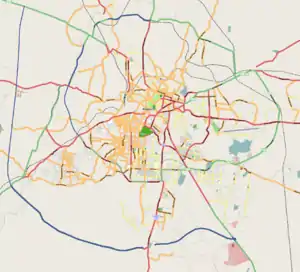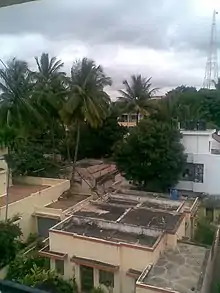Cooke Town
Cooke Town is a neighbourhood in Bangalore Cantonment, in Bangalore North-East, India. Built as a suburb before Indian Independence, it is one of Bangalore's oldest neighbourhoods, established when the Bangalore Civil and Military Station was governed by the Madras Government. Cooke Town is named after G H Cooke, President of the Bangalore Civil and Military Station Municipality between 1928 and 1934, with the Mayo Hall being constructed during his tenure. The suburb, along with other suburbs of the Bangalore Cantonment such as Fraser Town, Cox Town, Richmond Town, and Langford Town, has seen dynamic changes over last few years with large British Raj era bungalows being demolished to build luxury apartments. These developments have resulted in large scale tree-felling. However, Cooke Town still manages to retain some of its colonial charm, and is called the nicest place in the Cantonment by Bangalore historian Peter Colaco.[1] Cooke Town is a posh neighbourhood with plenty of greenery, parks, educational institutions, hospitals and is at close proximity to the Bangalore East Railway Station and the Bangalore CBD. According to Colliers International, Cooke Town is one of Bangalore's most costliest neighbourhoods, with the cost of property being in the range to INR 60000-65000 per sq.ft (in January 2020), just slightly lesser than the Bangalore CBD.[2][3][4][5]
Cooke Town | |
|---|---|
Neighbourhood | |
 Cooke Town | |
| Coordinates: 13.002557°N 77.6186101°E | |
| Country | India |
| City | Bangalore Cantonment |
| Government | |
| • Body | BBMP |
| Languages | |
| • Official | Kannada |
| • Spoken | Kannada, English, Tamil |
| Time zone | UTC+5:30 (IST) |
| PIN | 560005 |
| Lok Sabha Constituency | Bangalore Central |
| Vidhan Sabha Constituency | Jayamahal |
| Original Planning Agency | Bangalore Civil & Military Station Municipal Commission |
| Established | 1900 |
G. H. Cooke
G. H. Cooke, Esq., MC, ICS served as the Collector and President of the Bangalore Civil and Military Station Municipal Commission from 1928 to 1934.[6] He was also the president of the Bangalore Club between 1931-1933.[7] Cooke was also among the 'Fellowship of Baldwins', who supported the Baldwin Boys' High School.[8][9][10] In 1933, G. H. Cooke served as the Inspector of Schools, for Bangalore and Coorg.[11]
Location

Cooke Town is surrounded by the neighbourhoods of Fraser Town, Cox Town, Pottery Town, Richards Town, and Benson Town, which are similar in that they were all pre-independence parts of the erstwhile Bangalore Civil and Military Station of the Madras Presidency. The townscape being easily distinguishable from that of the Bangalore Pete and South and West Bangalore, which was under the erstwhile Mysore State.
People and culture
The Bangalore Cantonment has a large Tamil population. They trace their ancestry to the large number of Tamil soldiers, suppliers and workers who were brought into the Bangalore Civil and Military Station, by the British Army, after the fall of Tippu Sultan.[12][13][14][15][16][17] Cooke Town is also home to expats, foreign students from the Middle East and Africa. The suburb is home to Pentecostal Churches, and also includes a Korean Jehovah’s Witnesses congregation. A wide range of cuisines such as French, Vietnamese, Lebanese, Syrian, etc. are available in Cooke Town[18] A study by Colliers International indicated that Cooke Town was the second costliest suburb in Bangalore, with an average apartment with 3 bedrooms (3BHK), costing between INR 30-60 million (USD 450,000 to 1 million).[4]
Landmarks
Bangalore Pork Shop
The Bangalore Pork Shop is one of the Bangalore Cantonment's oldest establishment, and is located on Hutchin's Road. Its branch called the 'Bangalore Ham Shop' at M G Road at the Bangalore CBD was established in 1928.[18]
Milton Street Park
The Milton Street Park is located in Cooke Town. The Park is now being improved by the efforts of the Residents Welfare Association of Bangalore East (REWABE). Till a few years back, the park was badly maintained and used by miscreants for illegal activities. Repeated complaints to civic authorities, the local corporator and MLA did not yield any results. Finally, the Residents Welfare Association of Bangalore East (REWABE) took matters into their own hands, and raised funds by auctioning paintings by local children, which was used for improving the park. The Hand-in-Hand Flea Market held regularly at the park to raise funds has gained popularity in the city of Bangalore and gives the residents a platform to showcase and sell their handmade products, arts, crafts and homemade food.[19]
Ascension Church
The Ascension Church, located in Dacosta Layout, in Cooke Town, was established in 1966. Cardinal Lourdusamy and Archbishop Arokiaswamy helped build the present church, which was inaugurated on 21 December 1973. The church offers Mass services in English, Kannada and Tamil.[20]
Masjid-e-Munawara
The Masjid-e-Munawara mosque is located on Hutchin's Road at Cooke Town. The mosque has a large multi-storey commercial complex. Attached to the mosque is the 'Centre for Islamic Studies' consisting of an Islamic Library. The centre hosts debates on comparative religion. Fatwas issued by the mosque are prominently displayed in the notice board.
References
- Colaco, Peter (2003). Bangalore - A Century of Tales from City Cantonment. Media Books.
- Aliyeh, Rizvi (2 August 2015). "Resident Rendezvoyeur: What's in a name?" (Bangalore). Bangalore Mirror. Bangalore Mirror Bureau. Retrieved 11 August 2015.
- Nair, Anita (13 March 2015). "In many ways, Bangalore still retains its old-world charm" (Bangalore). Economic Times. ET Bureau. Retrieved 8 November 2015.
- Venkat, Apurva (30 June 2015). "Skywalks will push up housing projects near highways: Colliers" (Bangalore). Bangalore Mirror. Bangalore Mirror Bureau. Retrieved 8 November 2015.
- "Cooke Town, Bangalore". Property Wala. 2015. Retrieved 8 November 2015.
- Harshitha, Samyuktha (6 August 2013). "The forgotten leaders of Bangalore". Suttha Muttha. Retrieved 8 November 2015.
- "Past Presidents". Bangalore Club. 2011. Retrieved 8 November 2015.
- Weston, C N (1947). Baldwin Boys' High School, Retrospect & Prospect 1947. Bangalore.
- Johnson, Ronnie (1999). "Baldwin Boy's High School (Referred to earlier as the Episcopal Methodist School)". Children of Bangalore. Archived from the original on 19 March 2014. Retrieved 8 November 2015.
- "Bangalore Cantonment". The Quarterly Journal of the Mythic Society. Bangalore, India: Mythic Society. 95: 78. 2004. Retrieved 8 November 2015.
- Bageshree, S (10 January 2012). "A historic school in a state of decay" (Bangalore). The Hindu. Retrieved 8 November 2015.
- Dasharathi, Poornima (23 July 2008). "Cantonment: colonial past, multicultural present". Citizen Matters. Retrieved 23 December 2014.
- Srivatsa, Sharath S (31 October 2007). "Bangalore calling: it all goes way back…" (Bangalore). The Hindu. Retrieved 3 January 2015.
- Steve, Arul (17 April 2013). "Specialization On Social And Cultural Indifference Among Kgf Tamil Migrants". Word Press. Retrieved 4 January 2015.
- Rizvi, Aliyeh (18 July 2013). "Greet.Meat.Eat". A Turquoise Cloud. Word Press. Retrieved 4 January 2015.
- Aam AdMo (7 July 2012). "Right to be a Minority institution (and make majority profits)". Word Press. Retrieved 4 January 2015.
- Harshitha, Samyuktha (1 June 2013). "The Mootocherry of Bangalore". Suttha Muttha. Blogspot,com.au. Retrieved 4 January 2015.
- Prabhala, Achal (13 April 2013). "Local Geography: Cooke's corner". Live Mint. Retrieved 8 November 2015.
- Patel, Bharat A (13 April 2015). "The art of maintaining a park" (Bangalore). Bangalore Mirror. Bangalore Mirror Bureau. Retrieved 8 November 2015.
- "Welcome to Ascension Parish". Ascension Parish. 2014. Retrieved 8 November 2015.